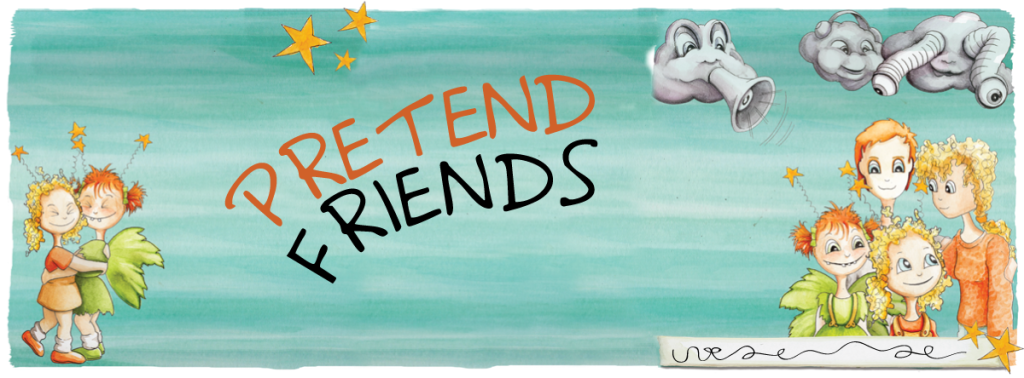In a special blog post for Mental Health Awareness Week, we’ve asked Alice Hoyle, author of Pretend Friends, to share her thoughts on therapeutic storybooks for children.
I always wanted to be a writer or a teacher. Since teaching was more likely to pay my bills I went down the route of educating the masses, whilst still scribbling down the odd poem or story when the mood took me (mainly when suffering avoidance stress from a major deadline!). I wrote my first published story Pretend Friends whilst doing some Masters research into inclusive storybooks. It was then that I realised there were very few story books to support discussions about serious mental illness with young children. There were a few books about depression but nothing to help explain about symptoms of psychosis such as hearing voices. So I decided to write my own story (partly in a spectacular effort of procrastination from said Masters!).
The idea for using the concept of ‘pretend friends’ as an analogy for schizophrenia came to me when spending time with my children and someone close to our family who has experienced psychosis. My eldest was talking about her imaginary friend Hector and the adventures they were going to go on. It struck me we are not concerned when children have imaginary friends but when adults hear voices it is a different matter. Pretend friends is an analogy children can relate to which simplifies some of the complexities of experiencing psychosis or living with schizophrenia to a level children can understand.
The key messages outlined in the book are gentle, non-scary, age-appropriate explanations about what it might be like to live with hearing voices or experiencing things that other people don’t experience. The story explores the adventures of Little Bea and her imaginary friend Nye-Nye, and compares them with the experiences of Big Jay and his pretend friends (the voices he hears). The story asks for people to be kind to people like Big Jay and to “love them just as they are”.
Another important message to include was to make sure that the main character, Little Bea, was absolved of any big responsibility to make Big Jay better, and that ways of supporting Big Jay in his recovery were explained. I didn’t want a child to feel worried or upset or that they needed to take on caring responsibilities if they found out someone close to their family was hearing voices. That should be a grown-up’s job!
I am so pleased that this book has been published as I think it is vitally important to start talking about mental health from a young age. This way children can learn to look after their own mental health, and to support their peers if they are experiencing issues of their own. I decided to donate all my royalties to the charity Rethink Mental Illness as writing this book wasn’t about making money, but about supporting families like my own with a tool that can help them have conversations about serious mental illness. After all, as a parent, I want my children to grow up to be kind and accept people for who they are, and not to worry or be scared of people who are different from them. As a health educator I want the same for all children. I truly believe that supporting children to understand mental illness, will help our society to become more inclusive, supportive and kind.
Alice Hoyle works as an Associate Advisory Teacher of Personal, Social, Health & Economic (PSHE) Education for the PSHE Association. Alice lives in Bath with her husband, two daughters and a plethora of pretend friends including Elfie, Li-Li, Ariella and Micub. Alice would love to hear from you if the story of Pretend Friends helps your family in some way, you can find her on Twitter as @AliceHoylePSHE.

My daughter (15yrs) has pychocis. My son is 8yrs old . It is hard for him to understand. Thank you for writing this wonderful book!
Great great idea. One in 4 children born with 22q 11. 2 deletion syndrome will develop psychosis / schizophrenia and will hear voices. It appears that for some adolescents and young adults with 22q these voices are at times telling them to harm either themselves or others. Are there any recommendations for any books when this happens? Thanks, Anne
Hi Anne,
Thanks for your comment.
We don’t have anything which specifically covers this particular issue, but we do have some books which look like they may be relevant and of interest to you. The first one would be ‘Mental Health Aspects of Autism and Asperger Syndrome’ – find out more about the book here: http://intl.jkp.com/mental-health-aspects-of-autism-and-asperger-syndrome.html
Another one which may be of interest is ‘A Practical Guide to Mental Health Problems in Children with Autistic Spectrum Disorder’, which you can find out more about here: http://intl.jkp.com/a-practical-guide-to-mental-health-problems-in-children-with-autistic-spectrum-disorder.html
Finally, you may want to browse some of our other titles which look at self harm in adolescents and young adults, which you can do by following this link: http://intl.jkp.com/uk/catalogsearch/result/?q=self-harm
We hope that helps!
Very interesting book. Where can I order it?
Hi Iris,
You can order a copy from the main book page here: http://intl.jkp.com/pretend-friends.html
Or it is also available through all good bookshops and online book retailers. If you have any problems you can always contact us at hello@jkp.com
My daughters dad suffers from schizophrenia.. She is 3 years old and he comes in and out of our lives and it’s very hard for me to explain to her what’s going on, especially now that she notices how he acts when he doesn’t take his meds. And she gets scared. Hopefully this book will help me explain the situation to her.
Hi, Im looking for a book or visual aid to help explain hearing voices to an older man with an intellectual disability. Due to his cognitive level he is having difficutly understanding his experience. Can you recommend anything?